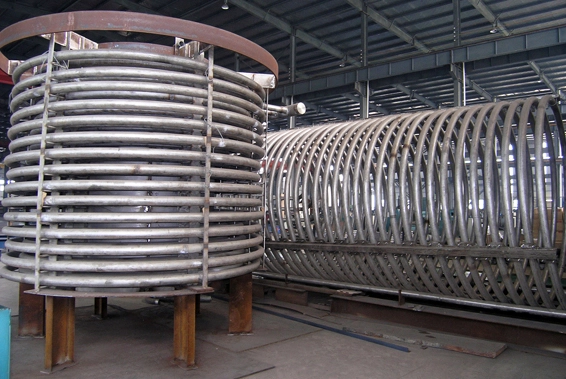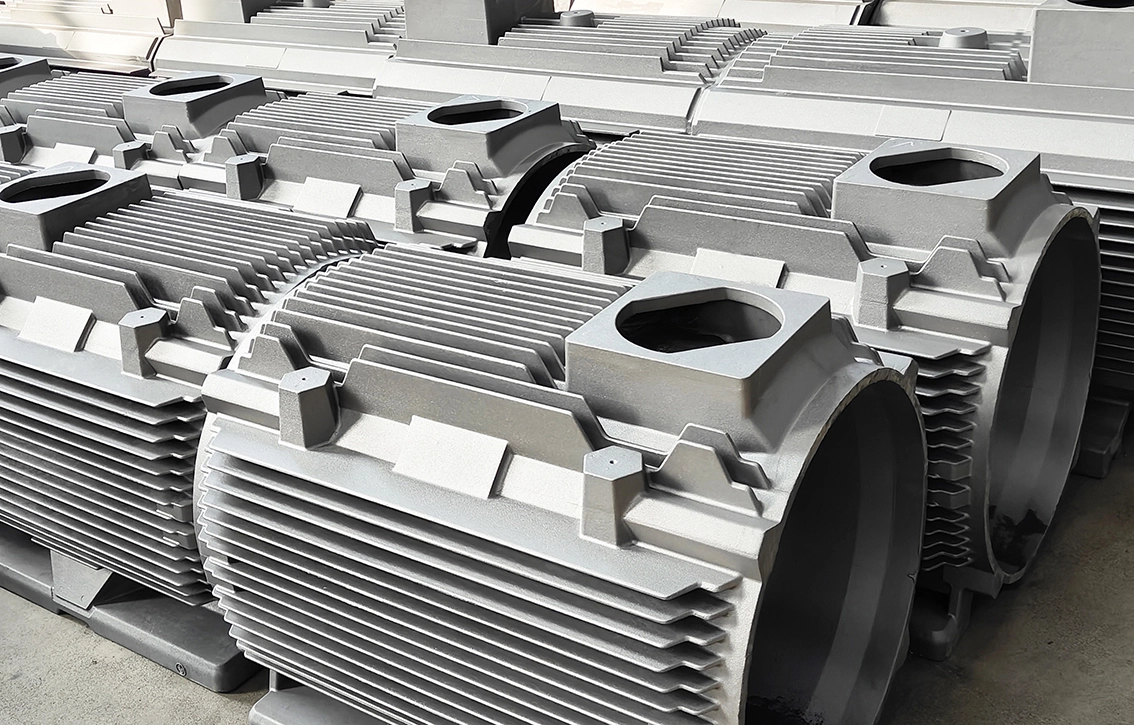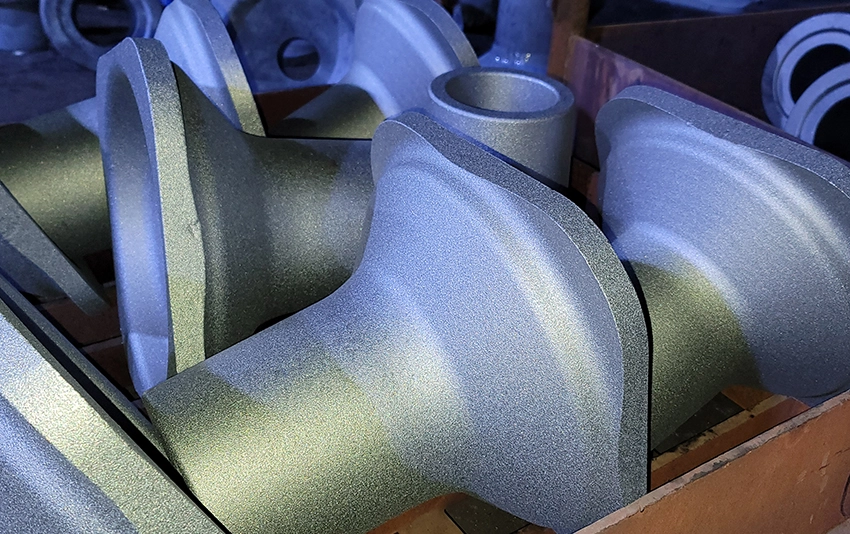Product Application: Centrifugal Cast Bends in Industrial Heating Systems
Centrifugal cast bends are key elements in industrial heating systems, enabling efficient fluid or gas flow in high-temperature, high-pressure settings. WALKSON’s bends are engineered for critical applications, including:
· Petrochemical Processing:
Steam Reforming Units: Bends connect tubing in reformers for hydrogen production, operating at temperatures up to 950°C while resisting corrosive gases like methane and carbon dioxide.
Pyrolysis Furnaces: Support ethylene production by managing gas flow in cracking processes, enduring thermal cycling and carburizing conditions.
· Fertilizer Industry:
Ammonia Production Plants: Ensure reliable gas flow in high-pressure reformer systems, maintaining performance in nitrogen-rich environments.
· Oil Refining:
Fluid Catalytic Cracking Units: Facilitate hydrocarbon flow in high-temperature cracking processes, resisting erosion and oxidation.
· Additional Uses:
Syngas production, direct reduction of iron (DRI) plants, and other heating systems requiring durable, high-performance bends.
These bends are built to endure extreme conditions, including temperatures up to 1100°C, pressures up to 45 bar, and exposure to corrosive and erosive media, delivering unmatched reliability in industrial heating systems.
Functions of WALKSON Centrifugal Cast Bends
WALKSON’s centrifugal cast bends provide essential functionality in industrial heating systems:
· Optimized Flow Dynamics: Precision-crafted bends minimize flow resistance, ensuring efficient gas or fluid movement and reducing energy losses.
· High-Temperature Durability: Constructed from high alloy and nickel-based materials (e.g., Inconel 601, Hastelloy C22, HP alloys), bends withstand prolonged exposure to extreme heat.
· Resistance to Degradation: Nickel-based alloys protect against corrosion, carburization, and thermal fatigue, ensuring long-term performance in aggressive environments.
· Structural Integrity: The centrifugal casting process produces a compact, uniform microstructure, boosting resistance to creep and mechanical stress.
· Flexible Configurations: Offered in various angles (e.g., 30°, 60°, 90°), sizes, and thicknesses to suit diverse heating system designs.
Manufacturing Process: Excellence and Standards Compliance
WALKSON’s centrifugal cast bends are produced using cutting-edge technology and rigorous adherence to international standards, guaranteeing superior quality. Below is an in-depth look at the manufacturing stages:
1. Material Sourcing and Verification
· Standards: ASTM A351, ASTM A494, DIN EN 10295, and client-defined specifications.
· Materials: High alloy steels (e.g., HH, HK) and nickel-based alloys (e.g., Inconel 718, Hastelloy B2).
· Process: Materials are procured from certified vendors and analyzed for chemical composition per ASTM E350 to confirm compliance with alloy requirements.
· Equipment: Advanced spectrometers for accurate material verification.
2. Alloying and Melting
· Standards: ISO 9001 and ASME Section IX for consistent melt quality.
· Process: Alloys are melted in electric arc or induction furnaces, purified to eliminate contaminants, and treated to achieve uniform composition.
· Equipment: High-efficiency EAF and vacuum induction melting units.
· Quality Control: Melt samples are tested to meet ASTM E350 standards.
3. Centrifugal Casting
· Standards: ASTM A781, EN 12680, and API 934 for casting quality.
· Process: Molten alloy is poured into a rotating mold shaped for bend geometry. Centrifugal force compacts the material, forming a dense, defect-free bend with a refined microstructure.
· Equipment: Automated horizontal centrifugal casting systems with precise control over rotation and temperature.
· Benefits: Delivers exceptional strength, thermal stability, and accurate bend profiles.
4. Thermal Processing
· Standards: ASTM A703, ASME Section VIII, and client-specific protocols.
· Process: Bends are heat-treated through annealing or quenching to enhance creep resistance, toughness, and corrosion properties.
· Equipment: Programmable heat treatment furnaces with real-time monitoring.
· Quality Control: Thermal cycles are tracked to comply with ISO 9001 standards.
5. Precision Machining and Surface Finishing
· Standards: ISO 2768 for tolerances, ASME B16.9 for fittings, and ASTM A999 for surface quality.
· Process: Bends are machined to exact specifications using CNC equipment, with surface finishes optimized for performance. Flanges or connectors are integrated as needed.
· Equipment: CNC milling machines, lathes, and polishing systems.
· Quality Control: Dimensional accuracy is verified using coordinate measuring machines (CMM).
6. Quality Control and Testing
WALKSON implements stringent testing protocols to ensure product reliability, offering full transparency to clients and third-party inspectors (e.g., SGS, Bureau Veritas). Clients can witness all tests as outlined in our Inspection and Test Plan (ITP).
Non-Destructive Testing (NDT)
· 100% X-Ray Inspection:
Standard: ASTM E142, EN 12681.
Purpose: Identifies internal imperfections like voids or inclusions.
Equipment: High-resolution digital X-ray systems.
Process: Full scanning of bends with detailed reporting of findings.
· 100% Eddy Current Testing:
Standard: ASTM E309, EN 1971.
Purpose: Detects surface and subsurface flaws, such as cracks or pitting.
Equipment: Multi-frequency eddy current testing units.
Process: Comprehensive surface testing for defect-free assurance.
· Ultrasonic Testing (UT):
Standard: ASTM A388, EN 12680.
Purpose: Confirms wall thickness consistency and internal integrity.
Equipment: Automated ultrasonic scanners with high-frequency probes.
Process: Full-length scanning to ensure structural compliance.
Destructive Testing (where applicable)
· Tensile Strength Testing:
Standard: ASTM E21.
Purpose: Evaluates strength and ductility under stress.
Equipment: High-capacity tensile testing machines.
· Creep Resistance Testing:
Standard: ASTM E292.
Purpose: Assesses performance under sustained high-temperature loads.
Equipment: Specialized creep testing ovens.
· Microstructure Analysis:
Standard: ASTM E1351.
Purpose: Verifies grain structure and material uniformity.
Equipment: Metallographic microscopes with digital imaging.
Hydraulic Pressure Testing
· Standard: ASME B31.3, API 934, and client requirements.
· Purpose: Confirms the bend’s ability to handle design pressures (e.g., up to 45 bar for heating systems).
· Process: Bends are pressurized with water to 1.5 times the design pressure and held to check for leaks or deformation.
· Equipment: Automated hydraulic testing systems with digital pressure gauges.
· Client Witnessing: Clients or third-party inspectors are welcome to observe testing for compliance verification.
Documentation
· Inspection and Test Plan (ITP): Detailed ITP outlines all inspection and testing phases, available for client review.
· Welding Procedure Specification (WPS) and Procedure Qualification Record (PQR): Pre-qualified per ASME Section IX for welded components, provided upon request.
· Material Test Reports (MTR): Issued per EN 10204 Type 3.1 or 3.2, documenting chemical, mechanical, and test data.
· Inspection Reports: Thorough records of NDT, pressure tests, and dimensional checks, certified by third-party inspectors if required.
· Reference List: Available to showcase WALKSON’s successful delivery of centrifugal cast bends to global industrial projects.
Advantages of Choosing WALKSON
Selecting WALKSON for centrifugal cast bends provides distinct advantages, positioning us as the top choice for industrial heating system components:
1. Exceptional Quality: Our bends adhere to the highest international standards, supported by comprehensive NDT and meticulous quality checks.
2. Bespoke Engineering: Custom angles, sizes, and alloy formulations tailored to specific heating system needs.
3. Global Trust: Proven success with major petrochemical, fertilizer, and refining projects, backed by a robust reference list.
4. Open Accountability: Third-party inspections (e.g., SGS, BV) and client-witnessed testing ensure trust and transparency.
5. Innovative Manufacturing: Advanced centrifugal casting, CNC machining, and NDT technologies guarantee precision and durability.
6. Expert Guidance: Our skilled engineers offer end-to-end support, from design consultation to system integration.
7. Timely Delivery: Optimized production and logistics ensure fast turnaround without sacrificing quality.
8. Eco-Conscious Practices: Sustainable manufacturing minimizes environmental impact, meeting global green standards.
9. Long-Term Savings: Robust bends reduce maintenance and downtime, lowering overall operational costs.
Consult with WALKSON Today
Transform your industrial heating systems with WALKSON’s high alloy and nickel-based centrifugal cast bends. Designed for resilience, corrosion resistance, and compliance with stringent industry standards, our bends deliver outstanding performance in the toughest environments.
Reach out to WALKSON now to explore your project requirements, request a quote, or arrange a consultation with our technical specialists. Visit www.walkson.com or email info@walkson.com (mailto:info@walkson.com). Choose WALKSON as your trusted partner for high-quality centrifugal casting solutions.
 English
English  Deutsch
Deutsch  français
français  русский
русский  فارسی
فارسی  العربية
العربية  Español
Español  日本語
日本語  한국어
한국어  italiano
italiano  português
português  dansk
dansk  Suomi
Suomi 







